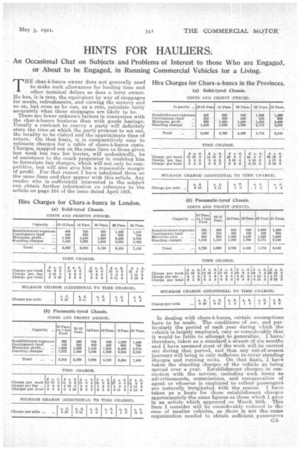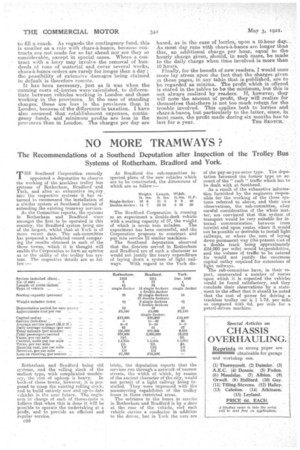HINTS FOR HAULIERS:
Page 21

Page 22

If you've noticed an error in this article please click here to report it so we can fix it.
An Occasional Chat on Subjects and Problems of Interest to those Who are Engaged, or About to be Engaged, in Running Commercial Vehicles for a Living.
THt char-A-banes owner does not generally need to make such allowances for loading time and other terminal delays as does a lorry owner. He has it is true the equivalent by way of stoppages for meals, refreshments, and viewing the scenery and so on, but even so he can, as a rule, calculate fairly accurately what these stoppages are likely to be.
There are fewer unknown factors in connection with the char-h-banes business than with goods haulage. Usually a contract to convey a party will definitely state the time-at which the party propose to set out, the locality to be visited and the approximate time of return. On that basis, it is comparatively easy to estimate charges for a table of chars-a-bancs costs. Charges mapped out on the same lines as those given last week but two for lorries, will undoubtedly, be of assistance to the coach proprietor in enabling him. to formulate fair charges, which will not only be cOMpetitive, but will also give him a reasonable margin of profit. For that reason I have tabulated them on the same lines and they appear with this article. Any reader who is sufficiently interested in the subject can obtain further information on reference to the article on page 254 of the issue dated April 12th.
In dealing with chars-bancs, certain assumptions have to be made. The conditions of use, and particularly the period of each year during which the vehicle is largely employed, vary so considerably that it would-be futile. to attempt to generalize. I have,therefore, taken as a standard a season of six months. and I have assumed most of the work will be carried. out during that period, and that any out-of-season journeys will bring in only sufficient to cover standingv charges and running costs. On that basis, I have taken the standing charges of the vehicle as being spread over a year. Establishment, charges in connection with the service, including such items as advertisements, commissions, and rennineration of agent cr whoever is employed to collect passengers are naturally terminated with the season. I have
taken as a naturally for these establishment charges approximately-the same figures as those which I gave in an article which appeared on March 29th. This item I consider will be considerably reduced in the case of smaller vehicles, as there is not the:samo organization needed to obtain sufficient passengers to fill a coach. As regards the contingency fund, this is smaller as a rule with chars-h-bancs, because contracts are not made for so far ahead nor are they so considerable, except in special oases. Where a contract with a lorry may involve the removal of hundreds of tons of material and cover several weeks, chars-IL-banes orders are rarely for longer than a day the possibility of extensive damages being claimed in default is therefore remote.
It has been necessary, just as it was when the running costs of lorries were calculated, to differentiate between vehicles working in London and those working in the provinces In the case of standing charges, these are less in the provinces than in London, because of the difference in taxation. I have also assumed that establishment expenses, contingency funds, and minimum_profits are less in the provinces than in London. The charges per day are based, as in the case of lorries, upon a 10-hour day. _ As most day runs with chars-A-bancs are longer than this, an additional charge per hour, equal to the hourly charge given, should, 111 such eases, be made to the daily charge when time involved is more than 10 hours.
Finally, for the benefit of new readers, I would once more lay stress upon the fact that the charges given in these pages, in any table that is published, are to be regarded as minima. The profit which is offered is stated in the tables to be the minimum, but this is not always realized by readers. If, however, they will note the amount of profit, they will realize for themselves that there is not too much retu3;n for the trouble involved. This applies both to lorries and chars-hebancs, but particularly to the latter, since, in most cases, the profit made during six months has to
last for a, year. THE SKOTCH.
































